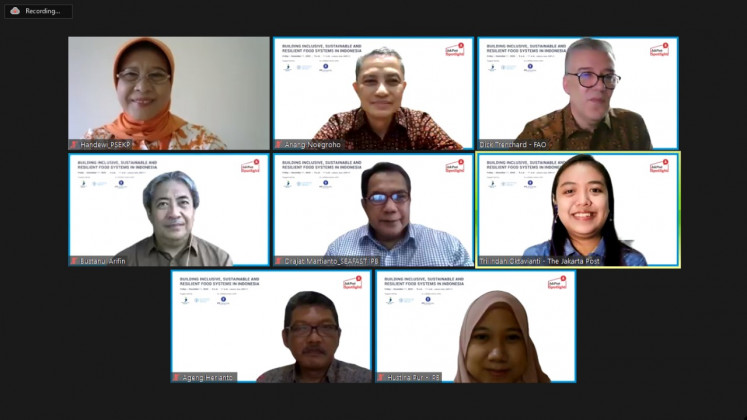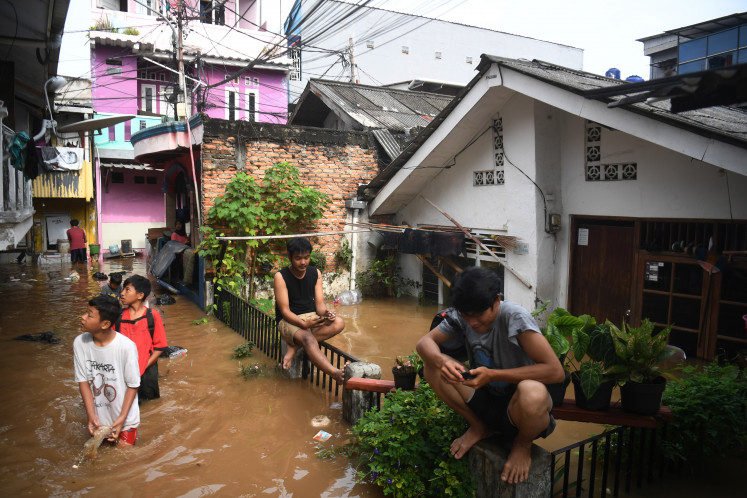Popular Reads
Top Results
Can't find what you're looking for?
View all search resultsPopular Reads
Top Results
Can't find what you're looking for?
View all search resultsLack of holistic strategies hampers Indonesia’s food systems
Change text size
Gift Premium Articles
to Anyone

T
he lack of holistic strategies, primarily marked by the weak connection between upstream and downstream industries, has hampered Indonesia’s efforts to create inclusive, sustainable and resilient food production systems.
This is the conclusion of a research study called Food Systems Analysis in Indonesia jointly conducted by the National Development Planning Agency (Bappenas), the Food and Agriculture Organization (FAO), as well as Bogor Agricultural University (IPB University).
It was disseminated during a JakPost Spotlight webinar titled Building Inclusive, Sustainable and Resilient Food Systems in Indonesia on Friday, Dec. 11 from 9 a.m. to 11 a.m.
Hosted by The Jakarta Post, the webinar featured Bappenas food and agricultural director Anang Noegroho, FAO Indonesia representative ad interim Richard Trenchard and research study team leader Drajat Martianto.
Also present in the webinar were Agriculture Ministry Indonesian Center for Agricultural Socioeconomics and Policy Studies senior researcher Handewi Purwati Saliem as well as Bustanul Arifin, a professor of agricultural economics for Lampung University (UNILA), who also serves as a senior economist for the Institute for Development of Economics and Finance (Indef) and is a professorial fellow for IPB University’s business school.
The webinar was moderated by the Post journalist Tri Indah Oktavianti.
Drajat said that, although Indonesia already had a Food Security Agency under the Agriculture Ministry, the agency did not have any coordination function to ensure synchronicity among the downstream and upstream food industries.
“Within the last five years, the 18 ministries that are pertinent to the food systems issue have not conducted any effective coordination meetings either,” Drajat said.
Due to the lack of effective coordination, Indonesia’s food systems face numerous issues in several elements of their entire ecosystem, from the food supply chain to distribution and access.
“For instance, nowadays the government focuses more heavily on food products that create big inflation. We also need to focus on food products that can contribute to the improvement of Indonesian human capital, such as vegetables, fruits, animal protein [sources] as well as nuts,” Drajat said.
The examples highlight the need for food system stakeholders and policymakers to synchronize economic concerns with those of human development in their decisions.

Meanwhile, inefficient distribution and logistics in an archipelagic landscape such as that of Indonesia have also caused disparity of food availability among regions, according to Handewi.
“This explains why, despite the availability of enough food reserves on a national level, many people still can’t access the food and benefit from it,” she said.
The inefficient and unsynchronized food systems in general have spelled a lot of nutritional trouble for Indonesians, especially those who are socioeconomically marginalized and live in remote areas, according to Drajat.
Trenchard, for instance, cited the 2020 State of Food Security in the World annual report, which revealed that between 32 and 76 percent of the people in different parts of Indonesia still struggle to access healthy food.
While Indonesia has made some remarkable progress in reducing the number of undernourished individuals in the country, bringing the prevalence of malnutrition down to 8 percent recently from almost 20 percent 15 years ago, Indonesia is still “bearing the triple burden of malnutrition,” Trenchard said.
For instance, more than one-third of Indonesian toddlers below 3 years of age are stunted and about three quarters of Indonesian adults are overweight. Many Indonesians also have micronutrient deficiencies.
Thus, it has become more important than ever to ensure that the production of food can equally meet the nutritional needs of all Indonesians, according to Drajat.
“Furthermore, we also need to pay attention not only to how we can boost our productivity level, but also to reduce the amount of our food loss and food waste,” Drajat said.
Besides being the source of the second-largest amount of plastic waste in the world, Indonesia is also the second-largest food waster in the world, with 300 kilograms of waste per capita per year, according to the 2017 Food Sustainability Index.
Food waste is a serious environmental problem, and, speaking of the environment, Bustanul added that our current climate crisis was also a factor that we needed to take into account when talking about food systems.
This is important because food cultivation requires the availability of natural resources, such as water, which has become scarce, according to Drajat. Farmers’ welfare, Bustanul said, was another indispensable factor to creating sustainable, inclusive and resilient food systems.
“Farmers’ welfare has become an important macroeconomic indicator,” Anang said.
Drajat came up with several recommendations from the study. First of all, we need to enhance the capacity of local food systems, which also include training the human resources. Second, we need an integrative budget allocation, which could be achieved through political will.
Third and fourth, we need strong institutional coordination as well as intersectoral cooperation, which includes a close dialogue among academia, the government and industry.
Fifth, we need to continuously advocate for solving the problem. Indonesia’s success in bringing down undernourishment was thanks to strong advocacy which prompted President Joko “Jokowi” Widodo to recognize it as a critical problem.









